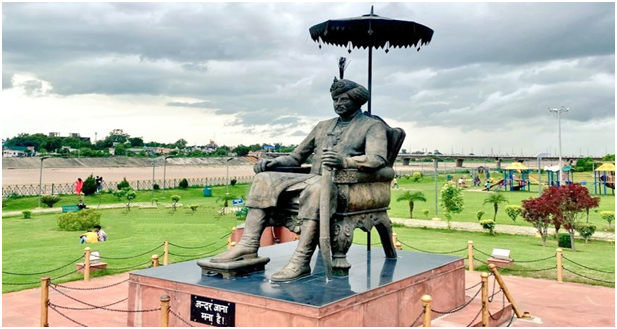Context:
After 75 years, Jammu and Kashmir observed a holiday on the birth anniversary of a Dogra monarch Maharaja Hari Singh.

About Maharaja Hari Singh
- Born on 23 September 1895 in Jammu, Singh was the son of Raja Amar Singh Jamwal whose brother Pratap Singh was the king of the state.
- The British showed a strong interest in Hari Singh’s academics after his father passed away in 1909.
- Singh attended Mayo College in Ajmer, Rajasthan, for his elementary schooling before enrolling in the British-run Imperial Cadet Corps in Dehradun for his military training.
- When his uncle Pratap Singh died at the age of 30, Hari Singh succeeded him as the Maharaja of J&K.
Accession of J&K to India
- Jammu and Kashmir was one among the 565 princely states of India on which the British paramountcy lapsed at the stroke of midnight on 15th August 1947 under the Partition Plan provided by the Indian Independence Act.
- The rulers of princely states were given an option to join either India or Pakistan. The ruler of Kashmir Maharaja Hari Singh did not exercise the option immediately. He instead offered a proposal of standstill agreement to both India and Pakistan, pending the final decision on the state’s accession.
- Pakistan entered into the standstill agreement but it invaded Kashmir from the north with an army of soldiers and tribesmen carrying modern weapons. In the early hours of 24th October, 1947, thousands of tribal Pathan swept into Kashmir.
- The Maharaja of Jammu and Kashmir appealed to India for help. He sent his representative Sheikh Abdullah to Delhi to ask for India’s help.
- On 26th October 1947, Maharaja Hari Singh fled from Srinagar and arrived in Jammu where he signed an ‘Instrument of Accession’ of J&K state.
- According to the terms of the document, the Indian Jurisdiction would extend to external affairs, communications and defence. After the document was signed, Indian troops were airlifted into the state and fought alongside the Kashmiris.
- In 1948, Maharaja Hari Singh announced the formation of an interim popular government with Sheikh Mohammed Abdullah as the Prime Minister.
Delhi Agreement
- In 1951, the state constituent assembly was elected. It met for the first time in Srinagar on 31st October 1951.
- In 1952, The Delhi Agreement was signed between Prime Ministers of India and Jammu & Kashmir giving special position to the state under the Indian Constitutional framework.
- On 6th February 1954, the J&K constituent assembly ratified the accession of the state to the Union of India.
- The President subsequently issued the constitution order under Article 370 of the Constitution extending the Union Constitution to the state with some exceptions and modifications.
- The special status of Jammu and Kashmir under Article 370 of the Constitution was revoked by the Parliament on August 5, 2019 and the former State was split into two Union Territories — Jammu and Kashmir and Ladakh.
